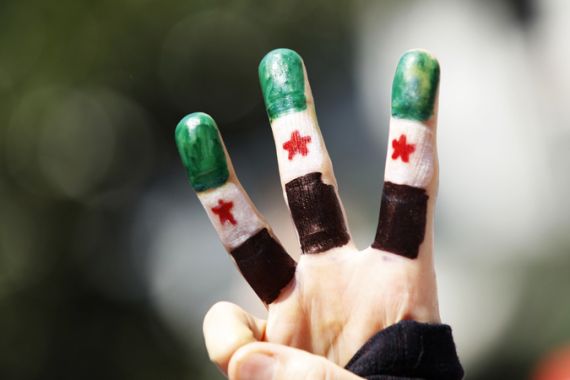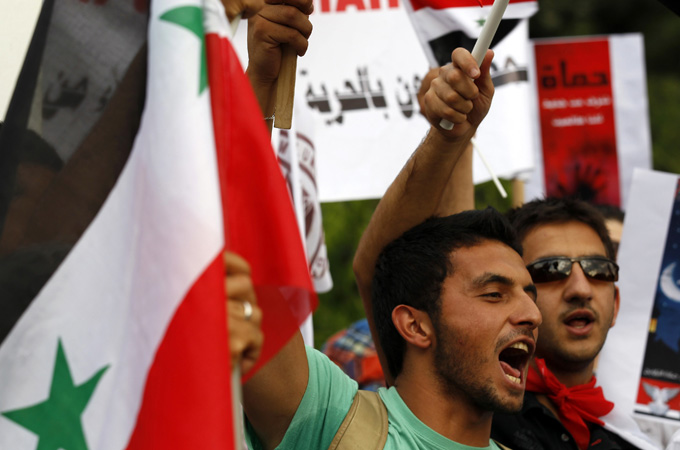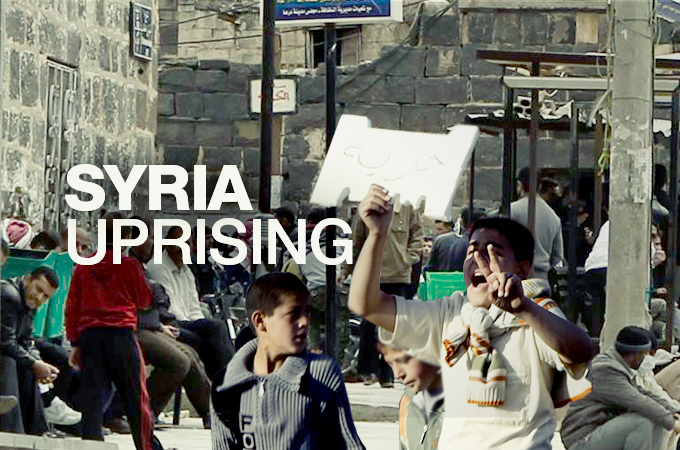Expats join Syrian revolution from afar
Subjected to brutal crackdowns, Syrian activists are getting help from an increasingly mobilised community in Canada.

 |
| It is easier for Syrians to protest Basher al-Assad’s government from outside the country [Reuters] |
With each day that the battle in Syria rages between anti-government protesters and security forces loyal to President Basher al-Assad, the state seems to crackdown harder, isolating the country’s population from the outside world.
But for officially-arranged press junkets where only the state media is sanctioned with the obvious exclusion of international journalists, the flow of information is tightly policed. Then there is the surveillance – personal, electronic and downright forensic – the Mukhabrat keeps track of telephone calls, social networks, e-mails and more.
So how does a population – which seems to be largely unarmed – continue to organise and protest against the government?
To start with, activists assume great risks in joining the various coordinating committees that mobilise protests. And now, an increasing amount of support for Syrians fighting to topple the government is coming from expatriate communities.
“Expat Syrians are important of course to relay the information, to lobby and campaign for Syria, via all means,” said Soazig Dollet, the North African and Middle Eastern bureau chief for Reporters Without Borders.
She added that while the extent of expat involvement is still less than say, Tunisia and Egypt, the mobilisation is increasing, at great potential peril to all parties.
“Such activities are risky for those who have family members in Syria. For instance, last Saturday, there was a demonstration organised in Paris and Syrian agents were filmed the demo and some came to physically assault persons (Syrian) participating to the demonstration,” said Dollet.
In the course of keeping track of the severe crackdowns on Syrian journalists, Reporters Without Borders has also been collecting information on how Syrian authorities are monitoring well, pretty much everyone – journalists, activists and non-activists alike.
Syrian intelligence, said Dollet, are highly sophisticated and well organised, monitoring all phone calls (SIM cards cannot be purchased without providing personal information), internet connections and all communication networks, going so far as to install spyware that keeps track of all users’ activities at internet cafes.
Some activists use programmes that mask their identities, but the state is ratcheting up its surveillance efforts, said Dollet, with a centralised control of the Web and a “cyber army” that trolls sites planting false information, hack Facebook accounts and use false identification to try and infiltrate activist circles.
Far away, so close
As communications are severely restricted within the country, the support of expat Syrian communities – in North America, Europe and the Middle East – for activists on the ground within the country has become a lifeline.
“With the Syrian revolution there are two parts, there is the inside part and the outside part,” said Saleem, a Syrian national living in Canada, told Al Jazeera. He, like many others involved in supporting the movement in Syria, did not wish to be identified out of concern that he or those he remains in contact with in Syria will be targeted by the government.
Activists he’s been in touch with in Hama and Idlib have been incarcerated for over a month now. Well, he hopes they’re merely incarcerated.
“God knows. When you deal with this type of regime…” his voice trails off.
Still, Saleem and his fellow activists remain on course.
“You are a coward if you don’t try to do something, but let me tell you… I’m nothing compared to people who (take) their lives in their hands in Syria and protest,” he said. “I’m nothing. I’m nothing.”
While the Syrian government charges that protests in the country are mobilised by foreign conspirators manipulating local saboteurs pointing the finger to an American-Israeli plot, he said that in fact, it is the expat community that has been “charged and enlivened” by all the protesters in Syria.
The overseas activists, he said, offer support where needed – via social media, via communicating information – as doing so within the Syria is increasingly hard – or via humanitarian efforts, such as posting videos that show protesters how to treat their own injuries, because Syrian security forces have also taken to raiding hospitals.
Forgetting fear
“I grew up in the kingdom of fear, but … as time goes on the fear is breaking down,” said Saleem.
Two years ago, before the revolution, his friend was contacted by someone from the Syrian embassy in Canada, who, he said, approached him “as a friend.” But it was immediately clear that the embassy representative wanted to pressure his friend to inform on other Syrian nationals.
“It’s the way they to it. The Syrian embassy gets every one of us to spy on each other. This way, we don’t trust each other and we live in fear,” he said. So vetting any new activist wanting to join their activities becomes a painstaking, paranoid process.
 |
| Read our complete coverage of the Syrian uprising |
“It’s very difficult,” he said, but with things heating up in Syria, expat activists find themselves taking some chances, one he said are necessary to unseat a state he doesn’t identify as a government, but “a mafia, run by one family.”
“Events have become overwhelming to the point where risks are being taken – if we don’t take this risk, we’re not going to do anything.”
Some expats, such as Noura Sheikhalzoor, are more open with their work.
A member of the Syrian Canadian Council (SCC),which has chapters in several cities, Sheikhalzoor clearly states her goal of supporting the Syrian revolution – condemns the actions of the Syrian state, calling for the ejection of the Syrian ambassador in Canada and wanting Canada to recall its ambassador from Syria.
“People back home are not fearing anything … I feel like I am underestimating what they are doing. They are going on the street, and I am not putting my full name on what I am doing?” she said when asked if she wished to be identified by her full name.
The main purpose of the 350-member council is to gather Syrians in Canada so they can apply coordinated pressure onto the Syrian government. It is one of several groups in Canada and the US doing so.
“The current thinking is that we don’t want this kind of diplomatic relationship because we think this regime is going to fall – so we don’t want Canada to consider them a legitimate regime,” said Sheikhalzoor
Noor A., a Syrian who has only been out of the country for a year said that some SCC members are involved in opposition activities on an individual level, with some even sending money back home to support the effort.
For her own part, she’s interested in raising awareness of the situation in Syria as well as creating solidarity among those in Canada who want to see thef Assad government collapse.
Like many of her peers in Canada, she’s frustrated and infuriated that she can’t even communicate the most basic sentiment to the people she cares about back home.
For instance, when her best friend’s brother was arrested in Damscus, Noor felt she couldn’t call her friend to see if she was okay or to ask about her brother.
“You can’t even ask. You can’t ask them directly – you never know what will happen to them,” said Noor, adding that this makes her appreciate her freedom all the more.
“I’m free here,” said Noor, adding that unlike her friends back home, she doesn’t “expect a bullet” for her activities.
Building pressure
And their efforts are starting to gain some traction in the Canadian government.
Jim Karygiannis, the member of parliament for Scarborough-Agincourt in Ontario, for one, has been keen to support the Syrian Canadian Council’s push for getting the Canadian government involved.
“The Middle East and the Arab spring is something that we’re watching very, very closely,” said Karygiannis.
“And we want the government of Canada to talk to the diaspora.”
Karygiannis has brought the requests of the SCC to the attention of John Baird, Canada’s minister of foreign affairs, and Bob Rae, the leader of the Liberal Party, has also issued a statement calling for the Canadian government to undertake immediate consultations with the Canadian Syrian community and facilitate the organisation of a diaspora conference on democracy and peaceful transition in Syria.”
The SCC’s request to recall the Canadian ambassador in Syria is one that might not get much support, however, because the Canadian embassy in Syria processes visas for applicants from not only Syria, but Iran, Jordan and Iraq. Transferring those duties to another embassy will “leave all those people in limbo” said Karygiannis.
Still, he feels that the Canadian government should step up.
“What happened in Libya and Syria seems too far away,” said the MP, “But the international community can’t be idle. Thousands of people have died…we’re going to have to bite the bullet. We’re going to have to do something there.”
Osama Kadi, a physician in Ontario, is among the active Syrian expats who is hoping to get international focus on Syria, although he understands why doing so has been a challenge.
“The international community need a body to speak to, not individuals,” said Kadi.
“Western countries don’t have that much leverage over Syria …You are dealing with a dictatorship system that is isolated, similar to North Korea,” said Kadi, adding that there aren’t even a solid number of civil society organisations – roughly 1,000 in Syria, compared to 30,000 in Egypt – with which international organisations could communicate.
“And they are very low calibre organisations – like for orphans,” said Kadi. “They do not have even enough independence to issue a newsletter.”
Having a group, such as the SCC, provides activists with an entity to represent them in their efforts, such as the push to get Canada’s Suncor Energy Inc. out of Syria in order to avoid further funding to the Syrian government, and, as one activist said, “indirectly helping the Syrian government to kill people there.”
A spokeswoman for the company told Al Jazeera that there has been contact between the SCC and Suncor, but that leaving Syria is a complicated choice for Suncor, which has both Syrian and international staff in the country.
The company, she said, recently signed an Ethics Charter (similar to an earlier policy) with Syria’s General Petroleum Corporation, calling for, among other things, respect for human rights.
Fighting back
Demonstrations and petitions signalling either goodwill or frustration can only do so much from outside Syria. To that end, some expats are getting more hands-on than others.
Even as Syrians in Canada say they are being monitored – and threatened – some are turning the tables on their adversaries, monitoring them.
 |
|
Ramsy said Hezbollah’s support for Assad makes things dangerous for Syrian activists within Lebanon [Reuters] |
“We’ve established what we’ve called the ‘shame list,'” said activist Sam Ramsy, describing a list of identified Syrian and Lebanese nationals in Canada who are helping the Syrian government in its overseas surveillance activities.
“They are spying on us, taking pictures, sending them to Syria. Some activists were phoned and told that their family members are being jeopardised,” he said.
Expat activists are circulating the “shame list” among themselves and are considering sharing it with Canadian authorities.
While Ramsy said that he’s been in contact with people who have been “very active inside the country” he said he does not support them either politically or financially. He sees his role as largely as one focused on gathering information.
“When it comes to money, fundraising, this is something I’m completely totally against right now…we all know how to send money if we need to send money there, and I do not want it to be done on a group level,” said Ramsy, adding that doing so would help the Syrian government delegitimise the revolution, adding fuel to its claim that the uprising is being funded by, say, the CIA, and they are funding a militia, or that the uprising is “a dirty game.”
But their mobilisation efforts go far beyond efforts on Canadian soil alone.
Kadi was among those who went to Turkey in mid-August to help set up a transitional National Syrian Council.
He said the council is intended to be the international arm of the political opposition in Syria, with the aim of helping set up a roadmap for activists within the country while communicating with the international community in ways activists in Syria can’t.
So far, the council has 70 representative members outside Syria and will have between 70 -100 members within the country. The council intends to dissolve its international portion once the revolution succeeds.
“We can’t represent entire Syria – we’re just trying to act as a political arm that can really speak with the international community and trying to communicate with the young revolutionary people on the ground,” said Kadi.
Expats – who are educated and highly motivated – communicate with protest coordinators within the country via Skype, satellite phones and even mobile phones, smuggled in by people Kadi referred to as “professionals” from Turkey, Jordan and Lebanon to those living near the borders of those countries. Because these phones operate on telecommunication systems belonging to other countries, they are safer for activists to use.
While unaware of any group effort to fund the telecom needs of activists in Syria, Kadi said that individual expats buy mobile and satellite phones for people on the inside, smuggling them in by land.
“Syrian security will capture thousands of the devices, but they can’t keep up with the amount of support – I believe there are more than 5 million Syrians outside Syria. If a quarter are supporting the revolution with money or with media… (activists) will finally have big time support for those device,” said Kadi, indicating that while many Syrian expats are actively supporting the uprising, many do it without joining groups such as the SCC.
Smuggling the devices into Syria is risky, but Kadi said that counting on luck, and sometimes bribery, it gets done.
“So it’s not easy,” said Kadi, “but it’s not impossible.”
Follow D. Parvaz on Twitter: @DParvaz